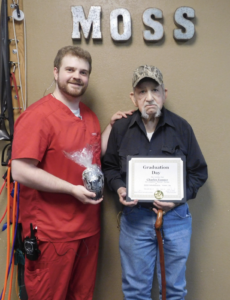At one of our free community education workshops I got this idea from talking to the participants. The original question is about therapy and exercises but quickly turned into the topic of stress and how to relieve it.
As we were wrapping up I was answering some of the group’s questions and got an interesting one. (Actually I hear this frequently).
It was, why come in for therapy when I can just find some exercise on the internet?
I thought that was a great question. Here is part of what I told her regarding exercises.
First you can get a ton of information from the internet, including exercises. So how is this different from what a Physical Therapist does and attending therapy?
A Physical Therapist will evaluate your specific complaints then prescribe specific exercises and treatments based on your specific phase of healing. This should aid and speed your recovery process. Thus helping you get out of pain and return to doing the things you want in life faster while removing the guesswork for you.
You will have a set of trained eyes watching your exercise technique and be able to make corrections. This applies to flexibility as well as strength training. Your Physical Therapist can also modify the exercise if it is too easy, too hard or gives you pain. This keeps you on the path to recovery and avoids frustrating setbacks.
Not to mention the benefits of hands on care to stretch the joints and massage the soft tissue.
As we were continuing one of the participants, who was actually a current patient, chimed in on the benefits of coming into therapy vs. doing it at home. The point she was making made it sound as if physical therapy was a quasi support group. And to some degree she is correct.
Over my 23+ year career I have always had patients talk not only to me but to others around them. Sometimes they shared a similar injury or surgery, other times completely different. The outcome seemed to be the same. Discussing their experience with others helped reduce some of the fear and anxiety along with the uncertainty of therapy. This I believe provides hope that recovery is possible.
As I listened to her explain the benefits she gets from coming into therapy I thought I would devote this week’s blog to some of the advantages of participating in a support group especially since the world as we know it has been turned upside down. I feel these points are applicable regardless of your condition (physical or mental).
First let’s address what stress is.
According to the Mental Health Foundation “stress is the feeling of being overwhelmed or unable to cope with mental or emotional pressure.”
Stress triggers the fight or flight response and produces several hormones in the process. When the stress event is over our hormones should return to normal levels. It is when the hormone levels do not drop that can leave us feeling overwhelmed and unable to cope.
This is where support groups can come in handy–even quasi type groups like you find at MOSS Rehabilitation Center.
Support groups create an anchor for people who are going through similar experiences.
A support group provides an opportunity for people to share personal experiences and feelings, coping strategies, or firsthand information about diseases or treatments. The emotional support derived from support group participation can help reduce stress which provides a positive health impact. Through time, all these benefits may help minimize stress and enhance recovery.
Here are five promising benefits from participation in support groups:
1) Access to encouraging companionship and helpful information
Most people look for support and they long for companionship. It gives a relief in gaining the understanding that others have similar concerns and are there to help and encourage you. Support groups offer lots of practical tips and resources for dealing with identified concerns, and members share their success stories that helped them move forward in their recovery.
2) Enhanced social skills and stress reduction
By opening up with other group members, you also have a chance to practice social skills effectively with others. This can be a very therapeutic and healing experience as they provide a safe place for people to be comfortable around others once more. As you work through various issues and concerns in the group, it’s common that you will begin to notice a reduced level of overall distress and discomfort.
3) Gaining hope and increased self-understanding
It is inspiring to see people who are further along their road to recovery and making great strides toward happier and healthier lives. These positive role models bring a renewed sense of hope for future recovery. As you learn more effective ways to cope and handle difficult situations, you also gain better understanding about yourself and your own unique personality.
4) Assist others through personal progress
Just as you benefit from the group experience, you can also help other group members as you grow and make progress. Others will be affected positively by hearing about your successes.
5) Affordability
One additional advantage of support groups is they are very affordable. In fact, many groups are free, and all will typically be cheaper than individual therapy sessions. Soak up information and learn effective coping strategies from other members who are doing well.
In this world full of adversities, know that you are never alone to face your personal battles. Carry on and find that support group you feel most comfortable with!
Through the years I have always thought that we (as Physical Therapist) were part time counselors and the clinic was like “Cheers’ ‘. (this was a TV sitcom years ago, if you are too young to get the reference, google it). Everyone knows everyone and they help provide encouragement and friendship.
We have a great time at work and love hearing the patients stories of success and failure, it lets us know we are all normal. The cool thing is that it is not always the staff that provides great advice, some of our patients “MOSS Family Members” give fantastic support and guidance as well.
Remember that the next time you are feeling a little down and need a “pick me up”. Stop into MOSS for some “group therapy”.
Have a great week.
If you would like to learn how we are incorporating these tips with our patients to help them recover quicker then give us a call at 817-220-MOSS (6677).
We love helping everyday people get back to doing the things they love to do.
At MOSS Rehabilitation Center we make it easy for you to get started. We even have a simple 3 step process.
1. Schedule a FREE NO Obligation, Discovery Visit with one of our experts. During this visit, you will talk with one of our friendly experts about your issues. This is a safe and confidential visit, you can trust that your safety and privacy is important to us. We are taking extra measures to ensure that you remain safe during this pandemic.
2. Receive a Customized (Individualized) Treatment Plan. Based on your free discovery visit, we will put together a custom, unique to you plan that will address all of your nagging pains and issues. The goal is to get you back to your healthy self as soon as possible while also addressing your issues for the long term.
3. Get Your Life Back and Do What You Love. The best result for us is a patient who tells us they can finally do what they love without the constant pain, stress, or issue they were facing. Together we can get you back to living life without worry.
So what do the most successful people do when they have health concerns? They address their problem.
I call it the 3 D’s Principle to handling any problem in life: 1. Don’t Ignore it, 2. Don’t Mask It, 3. Do Something About It.
NEXT ACTION: If you are really serious about your recovery start by calling 817-220-6677 today to schedule your FREE NO OBLIGATION Discovery Visit.
To your health,
Dr. Robert Moss PT, ScD, OCS. FAAOMPT


